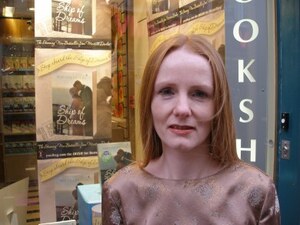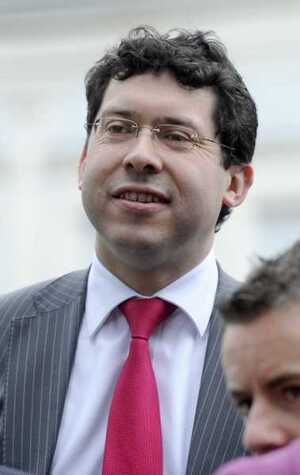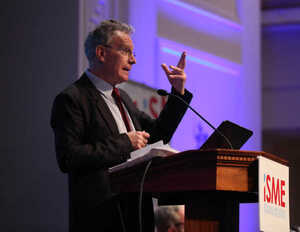Writer and Irish Independent columnist Martina Devlin, top, and Independent Senator Ronan Mullen, above, joined Seán O’Rourke on RTÉ this morning to talk about Pantigate.
During their discussion, Mr O’Rourke played sections of Rory O’Neill’s Nobel Call performance, as Miss Panti, at the Abbey Theatre last weekend.
At the end of the discussion, Mr O’Rourke asked Mr Mullen for this thoughts on Wednesday’s report from the UN Committee on the Rights of the Child which demanded that the Vatican “immediately remove” all clergy who are known or suspected child abusers, and called on the Vatican to investigate Ireland’s Magdalene Laundries.
Mr Mullen claimed UN committees, such as the UN Committee on the Rights of the Child, are ‘dodgy’.
Sean O’Rourke: “Has Rory O’Neill opened up a debate that has really taken off in a way that nobody really could have predicted?”
Martina Devlin: “I certainly don’t think it could have been predicted, there wasn’t huge public interest in the subject of gay rights in Ireland in recent times. It’s on the agenda now and I think that’s good that we’re debating it. There are different viewpoints obviously being aired and my own is that there is never any justification for withholding any equal right from one sector of society. I think gays are full members of society and they’re not being afforded the same rights as everyone else. I think the State is letting them down and I think that citizens of all hues have an obligation to stand up for their fellow gays.”
O’Rourke: “I suppose a lot turns on what one means by the word ‘homophobia’ and when it’s acceptable, if at all, to use that phrase in debate.”
Devlin: “I don’t think it is acceptable to use the phrase in debate. I think homophobia’s definition is quite clear, it’s hatred of gays and I don’t have a porthole into anyone’s soul to know how they feel about someone else. I don’t think that it’s a fair term to use, I don’t have a problem with it being taken out of commission, I think there are other words you could use like prejudiced or discriminatory or intolerant or fearful of change and that’s fundamentally what this comes down to, people are fearful of change, we always are nervous of any change to the status quo but we’re now looking at Irish life and whether the definition of marriage should be altered. You know? It was set up as a way of passing on property rights and a framework for rearing children, couples not get married and have no intention of having children and so that element of it has been sidelined to a certain extent. In terms of property rights, it’s very useful and convenient and why shouldn’t we extend that to gays?”
O’Rourke: “It’s one thing again, Ronan Mullen, I suppose there are two dimensions to this that have been very much in the headlines. One is the question of homophobia and how it’s used in debate and we’ll come on then to RTÉ’s handling of the apology and the original exchange. But what’s your own sense as to how the exchanges have been over the last 10 days or fortnight now at this stage?”
Ronan Mullen: “Well, first of all, I think it was an open and shut case of defamation and nobody should be second guessing the settlement that RTÉ made or that RTÉ should have made the settlement sooner. I heard, I don’t know if it is true…”
O’Rourke: “I was hoping we could leave that for the moment..”
Mullen: “But I think it characterises everything because the debate became one about whether it should be OK to use that smear which I certainly think is libellous. And by the way, it’s a sign of how far we’ve come that nobody is in any doubt that it is libellous to say that, provided it’s false of course, to say that somebody either fears or hates homosexual persons and so it should be. And, by the way, we’ve had a debate on homophobia in the Seanad and I welcome that. But we’ll also have to have a debate about new forms of prejudice. I have to say I think that homophobia is all but gone from the country. I think only yobs are homophobic now. I’m going up and down the country at the moment, as you know Sean, and, the European election campaign, from Donegal to Cavan, from Laois to Galway and to Sligo, etc., people aren’t talking about this issue. This is largely a media-dominated controversy and it’s not because people are homophobic…”
O’Rourke: “Is that fair…”
Mullen: “Because ordinary, decent people are getting on with their daily struggles which are economic, which are to do with emigration and so on. They have friends and loved ones who are gay, they have different views about whether we should redefine marriage or not but they are utterly respectful, that’s what I experience on a day-to-day basis in my discussions.”
Devlin: “John Lyons and Jerry Buttimer yesterday, in the Oireachtas, certainly would have put forward a very different view which is that, to quote Jerry Buttimer, they were beaten, spat on, chased, harassed and mocked for being gay. I mean, I’m not gay so I haven’t experienced it but they have.”
Mullen: “I agree with you and it’s terrible whenever that has happened. But the trouble is..We now have new forms of discrimination. If you look at social media the real hostility and bile, I don’t generally read, I use Twitter for example to communicate outwards. I don’t check what’s coming back in because 90% of the abusive stuff will tend to be around this issue. And it will come from people who deny anybody’s right to have a view different from theirs about how marriage should be defined. There’s a lot of hatred and nastiness out there towards people who used to be maybe seen in the majority opinion in the media. I know a woman, for example, whose son is going for the priesthood. And a neighbour, quite unwittingly asked her one day: ‘And do you think he’s a paedophile?’ You know? The amount of ignorance that is out there and it is generated by hateful comment, it is generated by the way we talk about public issues. There was a survey there last year I think done by Amárach, and a massive number of people had a hugely distorted idea about the amount of paedophilia in the church for example. So, what we’re getting now is a move of reaction in our culture, against the prejudices of the past but there are actually new people now who are being victimised in the present. It’s a lot harder for people like David Quinn…”
Devlin: “Senator, forgive me, Senator, I don’t mean to interrupt you but members of the, members of the priesthood aren’t being victimised, they aren’t being stigmatised and they aren’t being treated as second-class citizens, the way members of the gay community are. Members of the gay community are not afforded equal rights under Irish law. They’re not allowed to marry the people they love.”
Mullen: “I think the issue here is about civility and debate. And I don’t think anybody should be bullied out of the debate by the use of name calling and abusive terms. We need to have a civil debate in the coming years about how we define marriage, what children are entitled to in terms of parenting and so on. And the last thing we need are people coming out and trying to bully others out of the debate by calling them homophobic…”
Devlin: “I’m 100% agree and a libel award was made and it’s not really an issue..”
Later, and after part of Panti’s speech was played, in which she told how, on one occasion, a bunch of lads called her a ‘fag’ and threw a milk carton at her
O’Rourke: “Have you looked at it [the speech] yourself [to Mr Mullen]?”
Mullen: “I didn’t get a chance to see it but those people are yobs and there are yobs around sadly and I’m horrified that that happens. But by the way, can I just tell you about my own personal experience: I’ve been abused on the street because I support the current definition of marriage. I’ve been called very nasty things, I’ve been told that I’m physically ugly. It happens. People are nasty to people sometimes. And I’m very, very sorry about the fact that it has been a sad part of our culture, that this happened to homosexual people in the past and to some extent will always happen as long as you have a certain element of yobs in our society. But those people are the disrespected minority now and what is wrong and what has gone on here, that I would have great concerns about is, to try and equate those yobs with reputable journalists like Breda O’Brien, David Quinn, John Waters, who have always been at pains to be utterly respectful of people while, in a very intelligent and reasoned way, given their views on the definition of marriage. That’s what’s at stake here. It’s about free speech, it’s about respectful debate and it’s about not bullying people out of the public forum.”
Devlin: “Well I think you keep mentioning yobs and you’re right, that there are disrespectful people who, you know, say horrible things but the fact is that because we don’t have equality under the law, for all citizens, it gives ammunition to these yobs.”
Mullen: “Well that’s where I think I disagree with you.”
Devlin: “Is that the only place?”
Mullen: “…because that’s what you’re basically saying…what you’re saying, Martina, is, you’re saying to the parent, who loves their child unconditionally but who doesn’t happen to agree with redefining marriage for example, that that parent is homophobic. That is profoundly insulting.”
Devlin: “I’m not saying anybody is homophobic.”
Mullen: “That’s what your language amounts to. You equate.”
Devlin: “Not at all, no Senator, no, I am accusing nobody of homophobic, I’ve been at pains to say that I’m happy for the word to be decommissioned from this debate so I think it’s really wrong to trot it out.”
Mullen: “You can call me Ronan but I think that’s what you actually end up doing when you’ve said what you just said, you are equating, you are refusing to allow people have a different view, you’re basically saying that if you have a, if you support the current law, you’re contributing to the climate where people are homophobic – that is simply not true. It is people who are nasty.”
Speak over each other.
Mullen: “Can I just say that this is not what’s bothering the people that I am meeting up and down the country, it’s emigration, it’s unemployment, it’s the way rural areas have been…”
Devlin: “What’s wrong, what’s wrong, what’s wrong, just, can I ask him a question really quickly. What’s wrong with giving everybody the right to marry the person they love?”
Mullen: “Let’s discuss that in another day…”
Devlin: “No I’d just really like to know what’s wrong with it?”
Mullen: “Let’s discuss it another day but what you’re doing is, you’re distracting from the fact that good, decent people were libelled and you’re effectively adding to the case that it wasn’t libel at all and that’s utterly unfair.”
Later [after another section of Panti’s Nobel Call is played in which she talked about being told by journalist, barristers, et al, about what homophobia is and how gay Irish people are no longer able to say what they feel oppressed by as their definition has been disallowed]
O’Rourke: “Just a reminder of those dictionary definitions of homophobia. This from the Oxford dictionary: an extreme and irrational aversion to homosexuality and homosexual people. From the Cambridge dictionary: fear and dislike of gay people. And Webster’s: a strong dislike or fear of homosexuals, especially to an unreasonable degree. Martina, RTÉ’s settlement, right or wrong?”
Devlin: “Right. It was right for the reasons that were given which was that it was cheaper in the long run, I think the issue isn’t that RTÉ paid the money, I think that it was a clear case of libel, in my view, and in some ways it’s helped the debate widen out. People are thinking about the subject now whereas they weren’t before, but personally, I would have thought an apology would have been sufficient.”
Mullen: “Well, if it happens a next time, it should be seen as just as libellous, I heard a report Sean, I don’t know if it’s true, I don’t know if you know, that RTE could have settled this a lot cheaper if they were a lot more contrite sooner. I heard for example that a settlement was offered but, a charity of RTÉ’s nomination. If that happened that sounded like RTÉ was still trying to put the boot in. I’d like to get answers to some of those questions.”
Later
O’Rourke: “One other point that you might be interested in talking about: The Vatican came in for very strong criticism from the United Nations on the Committee on the Rights of the Child. Ronan Mullen, what did you make of that report?”
Mullen: “Well look it, we know the horrors the church has been through on child abuse and all the lessons that have been learned and all the positive stuff that’s happening. I saw that Pope Francis met Philomena Lee, for example, during the week, I think there’s a lot of good stuff happening. Frankly though, I have no respect for a lot of these UN agencies. I love the UN when it’s involved in peacekeeping and doing its good work but some of these UN agencies are just extremely ideological and frankly I don’t think they’re that interested in the rights of the child. Some of them, they tend to be quangos dominated with a very strong, ideological line and therefore I don’t think we have any lessons to learn from these external agencies. Ireland, we need to have a debate here, in Ireland about all of these issues. We’re making lots of progress but some of these agencies, in my view, are extremely dodgy and I’ll give you examples if you want.”
Listen back in full here
Pics: Martina Devlin and Photocall Ireland






